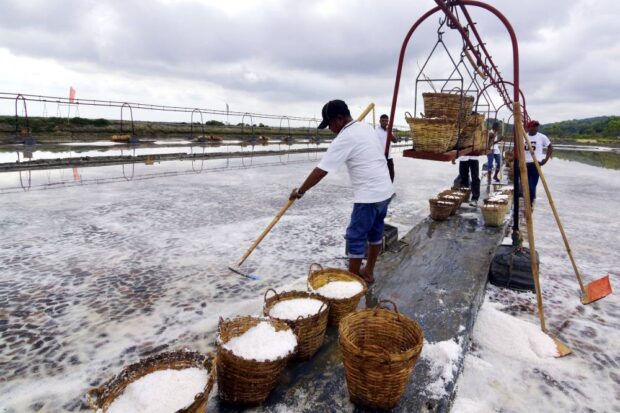Marcos signs law to revive local salt industry

INDUSTRY FOR AN ARCHIPELAGO | A farmer harvests salt at the 473.8-hectare Pangasinan Salt Center in Barangay Zaragoza, Bolinao town, in this 2023 file photo. (File photo by WILLIE LOMIBAO / Inquirer Northern Luzon)
MANILA, Philippines — President Ferdinand Marcos Jr. has signed Republic Act No. 11985, or the Philippine Salt Industry Development Act, into law in a bid to revive a sector considered “dying” due to years of government neglect.
In 2022, lawmakers pushed for the passage of the law amid concerns that the country was importing more than 90 percent of its salt requirements.
“This is quite shameful for an archipelagic country with more than 36,000 kilometers of shoreline. Let’s not waste further the potential to provide jobs for Filipinos on every island in the country by reviving the salt production industry,” one of the measure’s authors, Senate Majority Leader Joel Villanueva, said then in a privilege speech.
He cited data from the Philippine Chamber of Agriculture and Food Inc. showing that the Philippines imported 93 percent of its salt from Australia and China, up from only 15 percent in 1990.
RA 11985 seeks to establish a road map for the government to implement its programs for the development and management, research, processing, commercial and domestic use of salt.
Article continues after this advertisementThe president signed it on March 11. It mandates agencies to provide salt farmers with assistance on technology and research, financing, production, marketing, and other support services.
Article continues after this advertisementWith the new law, the government is looking to increase the country’s salt production, achieve salt sufficiency and become the next exporter of salt, Presidential Communications Secretary Cheloy Velicaria-Garafil said.
Salt industry expansion, modernization
The plans and programs are to be laid out in a Philippine Salt Industry Development Roadmap, which will include programs, projects, and interventions for the development and management, research, processing, utilization, modernization, and commercialization of Philippine salt.
The road map will also ensure that the new policy directions are still aligned with RA 8172, or “An Act for Salt Iodization Nationwide” or Asin.
The law also mandates the creation of a 16-member Philippine Salt Industry Development Council, headed by the agriculture secretary, to ensure the “unified and integrated” implementation of the salt road map and fast-track the modernization and industrialization of the industry. The secretary of the Department of Trade and Industry will sit in the council as vice chair.
The council will consist of representatives of farmers’ cooperatives, who will be handpicked by the Bureau of Fisheries and Aquatic Resources (BFAR) from five nominees from Luzon and three each from the Visayas and Mindanao.
Sen. Cynthia Villar on Sunday welcomed the signing into law of RA 11985.
“The dying industry will finally breathe new life,” Villar, principal sponsor of the bill, said in a statement.
“This is also a prayer heard for the sector’s workers and stakeholders who have been appealing to revitalize the salt industry,” she also said, adding that all coastal communities would be able to again produce salt.
According to her, the law would call for the expansion of the current salt farms concentrated in Pangasinan and Mindoro.
“The Department of Environment and Natural Resources and [BFAR] are mandated to map out, identify and designate public lands, including portions of municipal waters, as salt production areas within 60 days from the passage of this Act,” Villar said.
“Public land for salt production shall also be leased for a 25-year period, renewable for another 25 years, for use as salt farms. For this purpose, BFAR shall issue the Salt Production Tenurial Instrument where cooperatives and associations of subsistence and small producers and farmers shall be given preferential treatment,” she added.
Funding from import taxes
The senator also cited the need to meet the growing demand of Filipino households and the additional annual demand for 300,000 metric tons of salt as fertilizer for coconut farming under the 2021 Coconut Farmers and Industry Trust Fund Act.
Villar related that tariffs collected from imported salt would also be plowed back into the industry with the creation of the Salt Industry Development and Competitiveness Enhancement Fund (Sidcef).
“For 10 years, the Sidcef shall be earmarked for the: (1) provision of machinery and equipment, including seawater pumps, salt graders, salt harvesters, dump trucks and bagging machines, and salt iodization machines for beneficiaries who are into salt iodization; 50 percent; (2) establishment of salt farm warehouses/storage areas; 40 percent; (3) conduct of extension services; 5 percent; and (4) development of modern salt production and processing technology; 5 percent.”
READ: Marcos signs Philippine Salt Industry Development Act
The new law, Villar noted, also provided that the iodization of salt not intended for human consumption or local food production, as well as artisanal salt, would be rendered optional in the country.
“Importers, traders, and distributors of imported food-grade salt that will undertake fortification shall comply with the iodization standards set by the Department of Health,” she said.